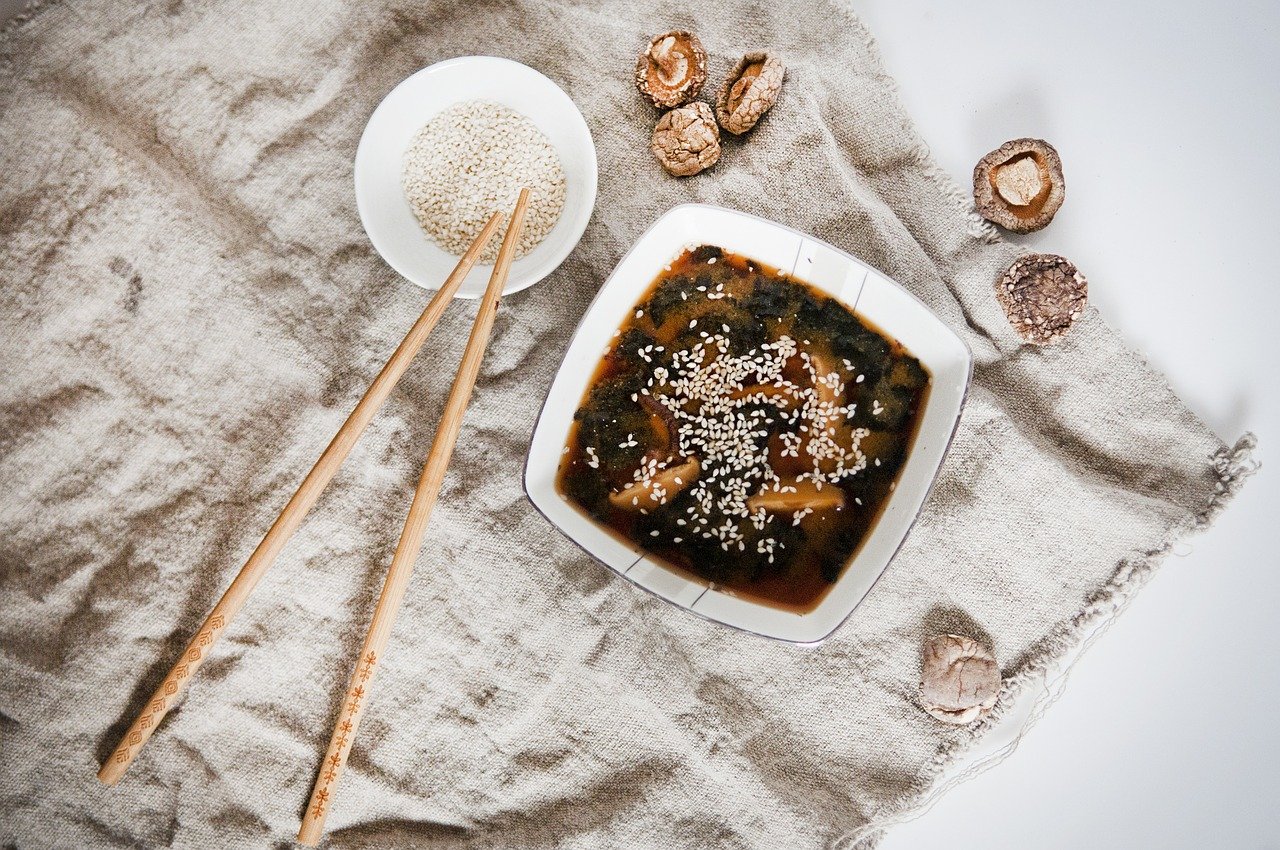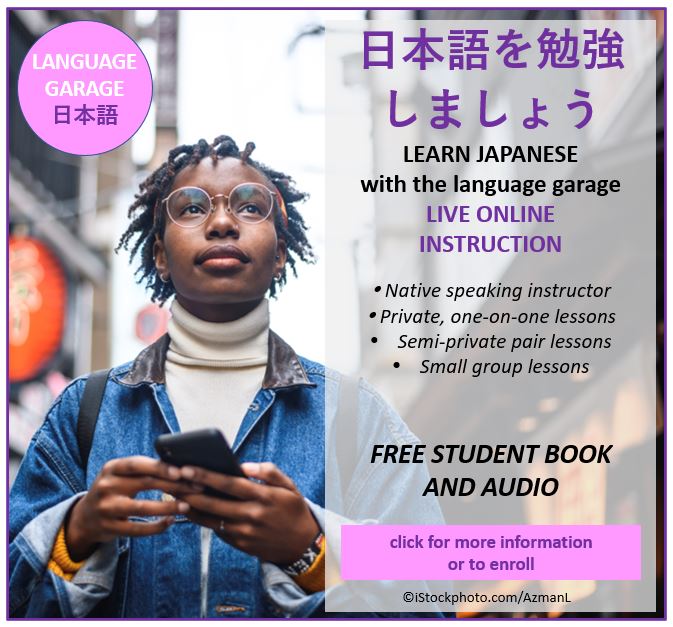Image by Яна Тикунова from Pixabay
In this post we’ll look at some Japanese vocabulary and expressions for an important part of everyday life: 台所 daidokoro the kitchen. 料理をしますか。Ryōri o shimasu ka. Do you cook? No matter how you answer, you probably spend a decent amount of time in the kitchen, so let’s dig in.
お皿、カップ、フォークosara, kappu, fōku Plate, Cups, Forks
Let’s start with the things you use to eat. Of course the basics are: お皿 osara plate, お椀 owan Japanese style bowl, ボウル bōru Western style bowl, ナイフ naifu knife, スプーン supūn spoon, フォーク fōku fork, 箸 hashi chopsticks, カップ kappu cup, グラス gurasu glass, ナプキン napukin napkin.
- フォークとナイフとスプーンはどこですか。
fōku to naifu to supūn wa doko desu ka.
Where are the forks, knives, and spoons? - フォークとナイフとスプーンは引き出しの中です。
fōku to naifu to supūn wa hikidashi no naka desu.
The forks, knives, and spoons are in the drawer.
- きれいなグラスはキャビネットの中です。
Kirēna gurasu wa kyabinetto no naka desu.
The clean glasses are in the cabinet. - コーヒーカップは棚の上です。
Kōhī kappu wa tana no ue desu.
The coffee cups are on the shelf. - ワイングラスを割ってしまいました。
Wain gurasu o watte shimaimashita.
I broke a wine glass. - 木の箸と金属の箸とどちらを使いますか。
Ki no hashi to kinzoku no hashi to dochira o tsukaimasu ka.
Do you use wooden or metal chopsticks? - ナプキンをいただけますか。
Napukin o itadakemasu ka.
Could I have a napkin, please? - スープ用にもう少し大きいボウルはありますか。
Sūpu yō ni mō sukoshi ōkī bōru wa arimasu ka.
Do you have bigger bowls for the soup? - きれいなお皿をキャビネットの中にいれてください。
Kiēna osara o kyabinetto no naka ni irete kudasai.
Please put the clean plates in the cabinet.
台所家電 Daidokoro kaden Kitchen Appliances
Even if you don’t have a lot of gadgets in your kitchen, you’ve probably got most of these: 冷蔵庫 rēzōko a refrigerator, コンロ konro a stove/cooker, オーブン ōbun an oven, 電子レンジ denshirenji a microwave oven, トースター tōsutā a toaster, 流し台 nagashidai a sink, 食器洗い機 / 食洗機 shokki araiki / shokusenki a dishwasher.
- 牛乳は冷蔵庫にあります。
Gyūnyū wa rēzōko ni arimasu.
The milk is in the refrigerator. - 冷蔵庫のドアを閉めてください!
Rēzōko no doa o shimete kudasai!
Close the refrigerator door please! - スープをコンロで調理します。
Sūpu o konro de chōrishimasu.
I cook soup on the stove. - オーブンでケーキとパンを焼きます。
Ōbun de kēki to pan o yakimasu.
I bake cakes and bread in the oven. - 電子レンジで残り物を温めます。
Denshirenji de nokorimono o atatamemasu.
I reheat left-overs in the microwave. - トースターでパンを焼きます。
Tōsutā de pan o yakimasu.
I make toast in the toaster. - 汚れた食器は流し台に置いてあります。
Yogoreta shokki wa nagashidai ni oite arimasu.
The dirty dishes are in the sink. - 食器洗い機から食器を出さなければいけません。
Shokki araiki kara shokki o dasanakereba ikemasen.
I need to empty the dishwasher.
And depending on where you live and what you like to eat, there’s also: 炊飯器 suihanki a rice maker, コーヒーメーカー kōhīmēkā a coffee maker, 電気ケトル denki ketoru an electric kettle, スロークッカー surō kukkā a slow cooker, ノンフライヤー nonfuraiyā an air fryer, ホームベーカリー hōmu bēkarī a bread machine, アイスクリームメーカー aisukurīmu mēkā an ice-cream maker, フライヤー furaiyā a deep fryer.
- いつも炊飯器を使っています。
Itsumo suihanki o tsukatte imasu.
I always use a rice cooker. - コンロでご飯は炊きません。
Konro de gohan wa takimasen.
I never cook rice on the stove. - 新しいコーヒーメーカーがいります。
Atarashī kōhīmēkā ga irimasu.
We need a new coffee maker. - 電気ケトルでお湯を沸かします。
Denki ketoru de oyu o wakashimasu.
I boil water in the electric kettle. - スロークッカーをよく使いますか。
Surō kukkā o yoku tsukaimasu ka.
Do you use your slow cooker often? - ノンフライヤーはあまり油を使いません。
Nonfuraiyā wa amari abura o tsukaimasen.
Air friers don’t use a lot of oil. - ホームベーカリーでパンを焼きます。
Hōmu bēkarī de pan o yakimasu.
I make bread in the bread maker. - 誕生日にアイスクリームメーカーをもらいました。
Tanjōbi ni aisukurīmu mēkā o moraimashita.
I got an ice cream maker for my birthday. - フライヤーはたくさん油を使います。
Furaiyā wa takusan abura o tsukaimasu.
Deep friers use a lot of oil.
まな板とボウル manaita to bōru Cutting boards and Mixing Bowls
No matter how much you cook, you probably have at least a few of these: まな板 manaita a cutting board, 包丁 hōchō a set of knives, ボウル bōru a mixing bowl, 木のスプーン ki no supūn a wooden spoon, おたま otama a ladle, フードプロセッサー fūdo purosessā a food processor, ハンドミキサー hando mikisā an electric mixer, 中華鍋 chūkanabe a wok, クッキングシート kukkingu shīto a baking sheet, バット batto a baking pan, フライパン furaipan a frying pan, 鍋 nabe a pot.
- まな板で野菜を切ります。
Manaita de yasai o kirimasu.
I cut vegetables on a cutting board. - カウンターにスペースがありません。
Kauntā ni supēsu ga arimasen.
There’s no space on the counter. - よく切れる包丁がありますか。
Yoku kireru hōchō ga arimasu ka.
Do you have a set of sharp knives? - ボウルの中で材料を混ぜます。
Bōru no naka de zairyō o mazemasu.
I mix ingredients in a mixing bowl. - 木のスプーンでスープをかき混ぜます。
Ki no supūn de sūpu o kakimazemasu.
I stir soup with a wooden spoon. - おたまでスープをよそいます。
Otama de sūpu o yosoimasu.
I use a ladle to serve soup. - フードプロセッサーは早くて便利です。
Fūdo purosessā wa hayakute benri desu.
Food processors are fast and convenient. - よくハンドミキサーを使いますか。
Yoku hando mikisā o tsukaimasu ka.
Do you use the electric mixer often? - クッキーはクッキングシートの上にあります。
Kukkī wa kukkingu shīto no ue ni arimasu.
The cookies are on the baking sheet. - バットの上に置いて魚を焼きます。
Batto no ue ni oite sakana o yakimasu.
I cook fish in a baking pan. - とてもよく中華鍋を使います。
Totemo yoku chūkanabe o tsukaimasu.
I use the wok very often. - フライパンで卵を焼きます。
Furaipan de tamago o yakimasu.
I cook eggs in a frying pan. - スープが作れる大きな鍋がありますか。
Sūpu ga tsukureru ōkina nabe ga arimasuka.
Do you have a large pot for the soup?
夕飯を作っています。 Yūhan o tsukutte imasu. I’m Making Dinner
If you’re looking for vocabulary and expressions related to cooking, check out this post. And here’s a bunch of food vocabulary that will come in handy when you’re talking about eating or cooking:
- パン pan bread
- 米 kome rice (uncooked)
- ご飯 gohan rice (cooked)
- パスタ pasuta pasta
- 麺 men noodles
- 肉 niku meat
- 鶏肉 toriniku chicken
- 牛肉 gyuuniku beef
- 豚肉 butaniku pork
- ハム hamu ham
- 魚 sakana fish
- ラム肉 ramuniku lamb
- 豆腐 toufu tofu
- 野菜 yasai vegetables
- トマト tomato tomato
- 玉ねぎ tamanegi onion
- にんにく、ガーリック nin’niku, gaarikku garlic
- レタス retasu lettuce
- ほうれん草 hourensou spinach
- アスパラガス asuparagasu asparagus
- キャベツ kyabetsu cabbage
- きのこ kinoko mushroom
- きゅうり kyuuri cucumber
- ピーマン piiman pepper (bell)
- 唐辛子 tougarashi chili pepper
- 果物 kudamono fruit
- りんご ringo apple
- 梨 nashi pear (Asian)
- 洋梨 younashi pear (Western)
- 桃 momo peach
- オレンジ orenji orange
- レモン remon lemon
- ぶどう budou grape
- いちご ichigo strawberry
- バナナ banana banana
- ナッツ nattsu nut
- ピーナツ piinatsu peanut
- 種 tane seed
- 小麦 komugi wheat
- シリアル shiriaru cereal
- 塩 shio salt
- 胡椒 koshou pepper
- 胡麻 goma sesame
- 蜂蜜 hachimitsu honey
- 砂糖 satou sugar
- 卵 tamago egg
- 牛乳、ミルク gyuunyuu, miruku milk
- 水 mizu water
- お茶 ocha tea
- 紅茶 koucha black tea
- 緑茶 ryokucha green tea
- コーヒー koohii coffee
- ワイン wain wine
- ビール biiru beer
- 豆乳 tounyuu soy milk
- 醤油 shouyu soy sauce
- チーズ chiizu cheese
- アイスクリーム aisukuriimu ice cream
- ケーキ keeki cake
- パイ pai pie
- クッキー kukkii cookie
- キャンディー kyandii candy
- 食べる taberu to eat
- 飲む nomu to drink
- 料理する ryourisuru to cook
容器、瓶、袋 yōki, bin, fukuro Containers, Jars, and Bags
Different foods are stored in different types of containers, so may want to say:
- {パスタ・クッキー・シリアル}一箱
{pasuta/kukkī/shiriaru} hitohako
a box of pasta/cookies/cereal - {じゃがいも・冷凍野菜}一袋
{jagaimo/rētō yasai} hitofukuro
a bag of potatoes/frozen vegetables - {水・ワイン}一瓶
{mizu/wain} hitobin
a bottle of water/wine - {牛乳・ジュース}ひとパック
{gyūnyū/jūsu} hitopakku
a carton of milk/juice - {豆・ツナ・スープ}一缶
{mame/tsuna/sūpu} hitokan
a can of beans/tuna/soup - {オリーブ・ピクルス・ジャム}一瓶
{orību/pikurusu/jamu} hitobin
a jar of olives/pickles/fruit preserves - {ケチャップ・マヨネーズ}一つ
{kechappu/mayonēzu} hitotsu
a container of ketchup/mayonnaise - 鶏肉ひとパック
toriniku hitopakku
a package of chicken - 豆腐一丁
tōfu icchō
a container of tofu
台所はきれいです! Daidokoro wa kirē desu! The kitchen is clean!
Even if you don’t use it much, the kitchen always seems to need cleaning. And there’s a whole set of vocabulary that you can use to talk about that: 箒 hōki a broom, モップ moppu a mop, スポンジ suponji a sponge, 食器用洗剤 shokkiyō senzai dish detergent, 食器拭き shokkifuki a dishtowel, スプレー式クリーナー supurēshiki kurīnā a spray cleaner, ペーパータオル pēpātaoru a paper towel, バケツ baketsu a bucket, 床用クリーナー yukayō kurīnā floor cleaner, ごみ箱 gomibako trash can/bin.
- 食器洗いをしなければいけません。
Shokkiarai o shinakereba ikemasen.
I need to do the dishes. - 食器用洗剤を買わなければいけません。
Shokkiyō senzai o kawanakereba ikemasen.
We need to buy dish detergent. - スポンジで食器を洗って、食器拭きで食器を拭きます。
Suponji de shokki o aratte, shokkifuki de shokki o fukimasu.
I use a sponge and a dishtowel to do the dishes. - 床を箒で掃きます。
Yuka o hōki de hakimasu.
I sweep the floor with a broom. - 床が汚くなったらモップをかけます。
Yuka ga kitanakunattara moppu o kakemasu.
I mop the floor when it’s dirty. - ペーパータオルとスプレー式クリーナーでカウンターを拭きます。
Pēpātaoru to supurēshiki kurīnā de kauntā o fukimasu.
I wipe the counter with a paper towel and a spray cleaner. - バケツに床用クリーナーとぬるま湯を入れます。
Baketsu ni yukayō kurīnā to nurumayu o iremasu.
I put floor cleaner and warm water in the bucket. - ごみを出しに行かなければいけません。
Gomi o dashi ni ikanakereba ikemasen.
I need to take out the trash. - ごみ箱が臭いです!
Gomibako ga kusai desu!
The trashcan smells bad!
Learn Japanese with the Language Garage
Check out our other posts on Japanese language, culture, and more. And if you’re looking for convenient and affordable live Japanese lessons with a real teacher, check out the Language Garage. Our lessons are given online in a virtual classroom, so it doesn’t matter where you live or work – we can come to you. And we have flexible options, with a free trial so that you can decide if there’s a fit. Check us out!






